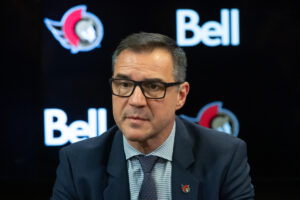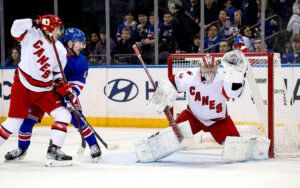The Starting Six series comes to you to dive into the best player at each position all-time for every organization. The biggest and best at each position, with the most memorable moments in franchise history. Here is the Chicago Blackhawks all-time lineup.
Starting Six: Chicago Blackhawks All-Time Lineup
Goaltender: Glenn Hall (1957-1967)
Obvious to Chicago fans would be the agonizing over whether Tony Esposito or Glenn Hall gets this distinguished spot as the Blackhawks’ all-time goaltender. Both boast formidable resumes; Esposito featured in the NHL’s First All-Star Team three times, whilst Hall did it seven times (five with Chicago).
Esposito also featured twice on the Second Team. Hall did so four times, twice with the Blackhawks. Each won three Vezina Trophies, Hall winning two in Chicago, and Esposito stunningly winning in his Rookie Year. Both Hall and Esposito won the Calder Trophy.
Perhaps the most important feature of Hall’s career was his durability and longevity at an elite level of play, especially as a goaltender. He holds the record for consecutive starts in goal with 502. Hall appeared in 13 All-Star Games from 1955 to 1969, nine of them coming in his years in Chicago. Esposito appeared in six himself through 17 seasons in the NHL, but compared to Hall’s number in just one more season, you begin to realise just how good Hall was for such a long stretch of time.
Both have had their numbers retired with the Blackhawks, a feature of many of the players on this list, and both are Hockey Hall of Famers. Given Hall’s incredible performance and durability over ten seasons with Chicago, he earns the distinguished spot on this team.
Left defenseman: Pierre Pilote (1955-1968)
Coming in on the left side of Chicago’s all time blueline is one-half of the retired number “3” jersey, Pierre Pilote. A three-time Norris Trophy winner, twice the runner-up, Pilote anchored the Blackhawks’ defence for 13 years before playing one final season in the NHL with the Toronto Maple Leafs.
In that time, he developed one of the greatest defensive pairings ever with Elmer Vasko. Pilote seemingly developed a toughness through osmosis by the man he skated in front of in goal for so many years, Glenn Hall. Playing 376 consecutive games, Pilote was ahead of his time in that he was one of the first great offensive defensemen, eclipsing the 50 point mark in three seasons and leading the league in scoring as a defenseman five times.
Right defenseman: Keith Magnuson (1969-1980)
The aforementioned Elmer Vasko is a noted runner-up for this position, due to his distinguished chemistry with Pilote and his decade in Chicago, but the late Keith Magnuson was simply too good to ignore. Magnuson, the other number “3” hanging in the rafters at the United Centre, might not have scored many goals or seen many All-Star appearances, but he anchored an extremely successful Blackhawks defence for 11 years, which went to two Stanley Cup Finals in 1971 and 1973.
However, what Magnuson did accumulate statistics-wise, was penalty minutes – many of which for fighting. As tough as they came, the Saskatoon product burst onto the NHL scene, topping 200 PIM in his first three seasons in the League.
Right wing: Steve Larmer (1980-1993)
Patrick Kane can feel a little bummed out here for being born a few years too late. In five years’ time, Kane is likely on it with relatively few arguments. However, in those five years, it’s also highly likely that Steve Larmer’s number “28” jersey will join the rafters at the United Centre.
Larmer arrived in Chicago in 1980 and instantly bought into the team’s revered culture. From 1982 to 1993, Larmer played 884 consecutive NHL games. If not for a silly contract dispute in 1994, he would have had a brilliant chance to break Doug Jarvis’ all-time record of 964. Instead, Larmer will have to settle for third.
Larmer does own the record for the most consecutive games played for a single franchise, however, a record that will not be broken anytime soon. The closest to reaching his total of 884 were Patrick Marleau (624) and Karl Alzner (532), who both left their clubs in free agency this summer.
Sadly, one mark he was not able to achieve was winning a Stanley Cup with the beloved team he spent 11 seasons with. To achieve that, Larmer spent the final two years of his career with the New York Rangers, winning the Stanley Cup as an alternate captain in 1994.
Centre: Stan Mikita (1958-1980)
It’s rare that you spend 15 years with an NHL team, score 1096 points, and captain them, but don’t end up being on a list like this, but that’s exactly the problem Denis Savard is confronted with, stuck behind arguably the greatest Blackhawk of them all, Stan Mikita. Playing for the franchise for a stunning 22 years, from age 18 to 40, Mikita’s feats with one franchise, in terms of longevity, are paralleled only by the great Gordie Howe, Nicklas Lidstrom and Ray Bourque.
Mikita’s triumphs need no explanation. He is 14th all-time in points, a four-time Art Ross Trophy winner, a six-time member of the First All-Star Team and a two-time member of the Second Team, as well as a Stanley Cup Champion in 1961. Mikita also has the notable achievement of winning the Hart, Art Ross and Lady Byng Trophy in the same season, the only player to do so. Oh, and he did it twice, in back-to-back seasons.
Unfortunately inflicted with dementia, his wife Jill is caring him for relatively reclusively, and at age 77, we have likely seen the last of Mikita publicly. Due to his degenerative disease, Mikita has little recollection of his life, his notable business and philanthropy measures, or his remarkable hockey career, in which he stands above all as the greatest contributor to one of the greatest hockey franchises of all time.
Left wing: Bobby Hull (1957-1972)
Regardless of your thoughts on Bobby Hull the person, he was truly an all-time great of the game. This is an article recognising hockey achievements, achievements which absolutely earn him a spot on the left wing of the Blackhawks’ all-time starting lineup. Hull’s attainments are truly standards that speak for themselves. A two-time Hart Trophy winner and a three-time Art Ross Trophy winner, Hull led the league in goals seven times (the most of any player) and is a Stanley Cup champion.
His accomplishments certainly extend outside United Centre ice. Hull is also two-time WHA champion and MVP with the Winnipeg Jets, but it is his exploits with Chicago that made him famous, often earning him multiple on-ice taggers, and won him his place in this team. Hull won just about everything the game had to offer and was inducted into the Hockey Hall of Fame just three years after his retirement.
Unfortunately, Hull has tarnished his reputation with despicable acts of physical and mental abuse since his retirement. My conscience compels me to mention them, so that when one thinks of ‘The Golden Jet’, they recognise that name as one only hockey in nature, and think also of a figure that possessed sad personal flaws, which should most unfortunately never see him as a franchise ambassador again.
Hull has left a mark on this team that will stand forever, as it currently stands immortalized outside the United Centre in the city that, for 15 years, he made his own.
Main Photo:






